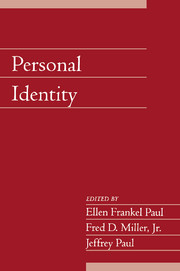Book contents
- Frontmatter
- Contents
- Introduction
- Acknowledgments
- Contributors
- Experience, Agency, and Personal Identity
- When Does a Person Begin?
- Persons, Social Agency, and Constitution
- Hylemorphic Dualism
- Personal Identity and Self-Ownership
- Self-Conception and Personal Identity: Revisiting Parfit and Lewis with an Eye on the Grip of the Unity Reaction
- The Normativity of Self-Grounded Reason
- Rationality Means Being Willing to Say You're Sorry
- Personal Identity and Postmortem Survival
- “The Thing I Am”: Personal Identity in Aquinas and Shakespeare
- Moral Status and Personal Identity: Clones, Embryos, and Future Generations
- The Identity of Identity: Moral and Legal Aspects of Technological Self-Transformation
- Index
The Identity of Identity: Moral and Legal Aspects of Technological Self-Transformation
Published online by Cambridge University Press: 05 July 2014
- Frontmatter
- Contents
- Introduction
- Acknowledgments
- Contributors
- Experience, Agency, and Personal Identity
- When Does a Person Begin?
- Persons, Social Agency, and Constitution
- Hylemorphic Dualism
- Personal Identity and Self-Ownership
- Self-Conception and Personal Identity: Revisiting Parfit and Lewis with an Eye on the Grip of the Unity Reaction
- The Normativity of Self-Grounded Reason
- Rationality Means Being Willing to Say You're Sorry
- Personal Identity and Postmortem Survival
- “The Thing I Am”: Personal Identity in Aquinas and Shakespeare
- Moral Status and Personal Identity: Clones, Embryos, and Future Generations
- The Identity of Identity: Moral and Legal Aspects of Technological Self-Transformation
- Index
Summary
I. A Sketch of the Project
Changes in the world, arranged by us or not, sometimes drive us to reexamine the conceptual structures we use to describe and evaluate that world. In this essay, I review the ideas of personal identity, and certain related abstractions, that might be affected by technological developments in the life sciences. In particular, I consider whether the concept of identity might require revision under the impact of certain biotechnological developments—those that increasingly enable relatively precise modifications of the genetic development of traits and of their ultimate expression. I deal both with control of the traits of existing beings (including fetuses and developed embryos, whose germ lines, unlike those of early embryos and of gametes, can no longer be altered) and with germ-line interventions. I will, of course, try to explain what I mean by “conceptual reexaminations” that are “driven” by changes in the world — technological developments in particular.
If technology confuses us about identity, it will also, and necessarily, confuse us about the moral, legal, and political roles of merit and desert. And in turn, if merit and desert ascriptions are made more uncertain than they already are, then equality, fairness, and justice constraints also become, to that extent, more muddled. For many, keying the size of rewards to degree of merit (at least in some senses of “merit”) does not violate standards of equality or fairness, and may indeed promote them.
- Type
- Chapter
- Information
- Personal Identity , pp. 308 - 374Publisher: Cambridge University PressPrint publication year: 2005
- 2
- Cited by



